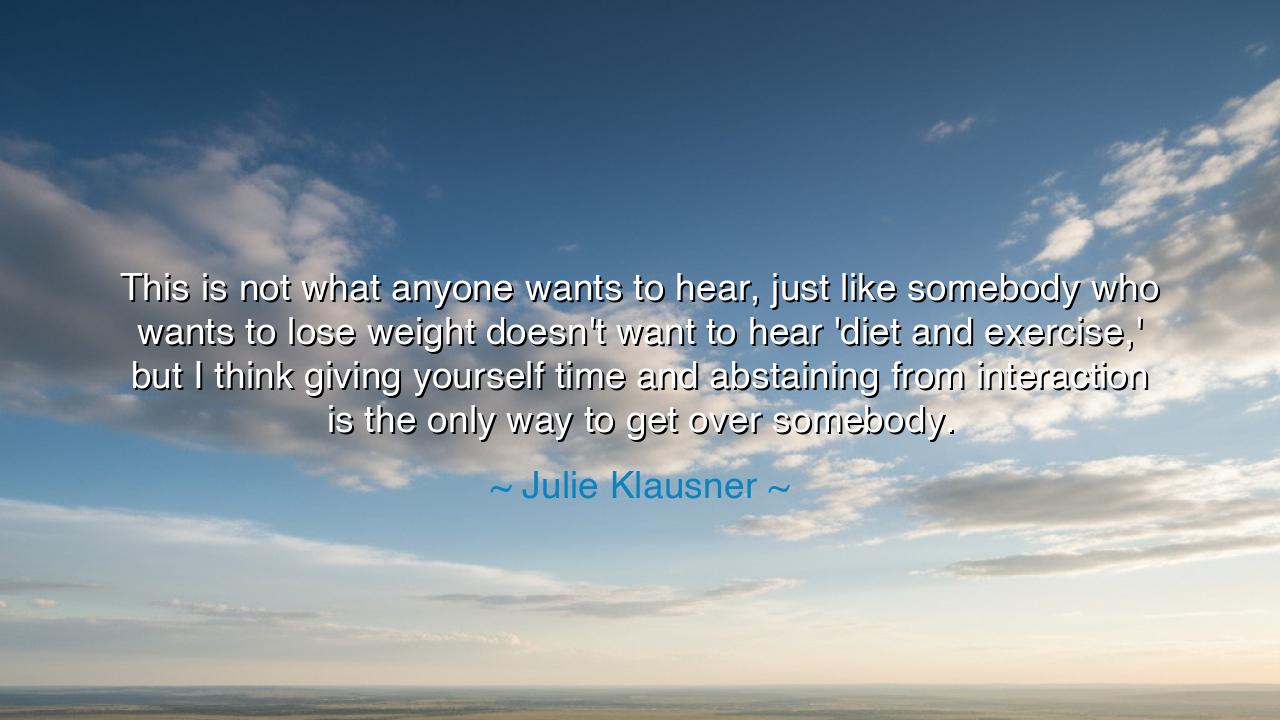
This is not what anyone wants to hear, just like somebody who
This is not what anyone wants to hear, just like somebody who wants to lose weight doesn't want to hear 'diet and exercise,' but I think giving yourself time and abstaining from interaction is the only way to get over somebody.






In the words of Julie Klausner, there rings a truth both bitter and liberating: “This is not what anyone wants to hear, just like somebody who wants to lose weight doesn’t want to hear ‘diet and exercise,’ but I think giving yourself time and abstaining from interaction is the only way to get over somebody.” These words are not wrapped in sweetness; they are the iron truth of healing, forged in the furnace of heartbreak. The human heart, when wounded by love, craves comfort, distraction, or shortcuts. Yet Klausner reminds us that no shortcut exists in the sacred labor of letting go. Just as the body cannot be transformed without the discipline of diet and exercise, so too the soul cannot be mended without the twin virtues of time and abstinence—the patient art of distance from what once consumed us.
To heal from love is to walk through a storm that once promised shelter. We are tempted to look back, to reach out, to reopen wounds that are only beginning to close. But the ancients knew—though they used different words—that every act of renewal begins in solitude. To abstain from interaction, as Klausner says, is to create sacred space around the heart, a silence in which pain can speak and, at last, dissolve. The heart, when left undisturbed, begins to remember itself—not as half of something broken, but as something whole.
Consider the story of Antony of Egypt, the great desert father. When his heart was troubled by the vanities of the world, he withdrew into the wilderness. There, far from voices that tempted and memories that bound him, he found what the world could not give: peace. For years, he lived in solitude, battling his inner storms until his spirit was calm and pure as still water. Many thought his retreat madness; yet from his silence came wisdom, and from his isolation, strength. In this, Antony embodies Klausner’s truth: to recover one’s soul, one must sometimes turn away, not out of bitterness, but out of reverence for one’s own healing.
Yet the world mocks such stillness. It urges us to move on quickly, to find another, to stay busy, to talk, text, scroll, distract. But these are illusions of comfort. The heart does not mend when we feed the memory of what hurt us; it heals when we starve it. To abstain is to deny the mind its self-inflicted poison—the endless analysis, the “what-ifs,” the false hope. To abstain is not punishment; it is purification. It is the slow restoration of dignity to a heart that has forgotten its own worth.
There is wisdom, too, in time, that ancient healer who asks for no belief but patience. Time, though silent, does its work faithfully. What seems unbearable today will fade like mist as the days pass. The ache softens, the memories lose their sharpness, and one morning you awake lighter than before, unsure when the weight began to lift. This is not the magic of forgetting—it is the grace of healing. Time, coupled with solitude, teaches us that love lost does not mean life lost; it is merely the turning of one season into another.
And so, when sorrow grips your heart and you long to reach out to the one who caused it, remember: the hand that heals must be your own. Withdraw into yourself, not to wallow, but to renew. Fill your hours not with desperate messages but with acts of care—walks beneath the sun, meals cooked with intention, words written but not sent. Rebuild yourself as a craftsman rebuilds a temple—stone by stone, slowly, reverently. The silence you keep will not be empty; it will be sacred.
Let the lesson be clear: do not chase healing through noise. True restoration demands stillness, patience, and distance. As a muscle strengthens through rest as much as through effort, so too the heart grows resilient in its quiet. The ancients would call this temperance—the discipline of the soul that leads to freedom.
And to you who listen, wounded yet brave, take this as both comfort and command: give yourself time, and let absence be your medicine. Do not fear the loneliness; it is only the shadow before dawn. For in the fullness of time, the heart will remember not what it has lost, but what it has learned—and it will rise, wiser, gentler, and more whole than before.






AAdministratorAdministrator
Welcome, honored guests. Please leave a comment, we will respond soon